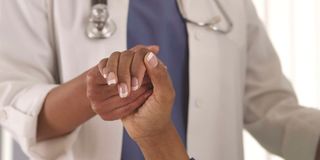My doctor caressed me, said I’m his favourite patient

A doctor attends to his patient. Every person has the right to be treated with dignity and respect, especially in medical settings.
What you need to know:
- The Sexual Offences Act, 2006, is a significant legal framework in Kenya and addresses various forms of sexual misconduct.
- Inappropriate behaviour, involving touching without consent and making inappropriate remarks, can be considered a violation of bodily integrity.
Dear Vivian,
I am writing to seek your guidance on a distressing incident that occurred during my recent visit to a gynaecologist for a regular check-up. While on the examination table, the gynaecologist in question inappropriately caressed my genitalia, saying I am one of his favourite patients and that he usually looks forward to my visits. This experience left me feeling deeply uncomfortable and traumatised. Does this behaviour constitute a legal offence and what are my options?
Moraa,
Kisii County
Dear Moraa,
In Kenya, every person has the right to be treated with dignity and respect, especially in medical settings. The incident you described raises serious ethical and legal concerns.
The gynaecologist's inappropriate behaviour, involving touching without consent and making inappropriate remarks, can be considered a violation of your bodily integrity and potentially constitutes a criminal offence under Kenyan law.
The Sexual Offences Act, 2006, is a significant legal framework in Kenya and addresses various forms of sexual misconduct. Section 11 of the Act criminalises any form of indecent act, including non-consensual touching, and prescribes severe penalties for offenders.
In your case, the gynaecologist's actions could fall under this provision, considering the breach of your bodily autonomy and the inappropriate nature of his behaviour.
Furthermore, the incident also raises concerns about professional ethics and medical malpractice. The Kenya Medical Practitioners and Dentists Act sets out the standards of conduct expected of medical practitioners. This Act outlines professional misconduct, which includes behaviour that violates patients' trust and dignity.
The Medical Practitioners and Dentists Board, established under the same Act, oversees the conduct of medical practitioners and has the authority to investigate complaints against them.
In addition to the legal avenues available to you, it's important to highlight the significance of your case within the context of international human rights standards.
The incident violates your rights to dignity, privacy, and non-discrimination, as provided in various international agreements and conventions that Kenya is a party to, including the Universal Declaration of Human Rights and the Convention on the Elimination of All Forms of Discrimination Against Women.
Given the gravity of the situation, I strongly recommend taking immediate action to address this issue. Here are the steps you can consider taking to protect your rights and seek justice:
First, document the incident. Write down a detailed account of the incident, including the date, time, location, and any statements made by the gynaecologist. Second, preserve evidence. If there are any witnesses, try to obtain their contact information. Preserve any relevant documents, such as appointment records or receipts.
Third, file a complaint. Report the incident to the Medical Practitioners and Dentists Board. They have the authority to investigate complaints against medical practitioners and take disciplinary actions if necessary.
Then you can seek legal assistance by consulting with a lawyer experienced in gender-based violence and human rights issues. They can guide you through the legal process and help you understand your rights and options. Lastly, engage support networks such as Fida-Kenya or the Gender Violence Recovery Centre for emotional support and legal advice tailored to your situation.
Vivian
The writer is an advocate of the High Court of Kenya and award-winning civil society lawyer ([email protected])





